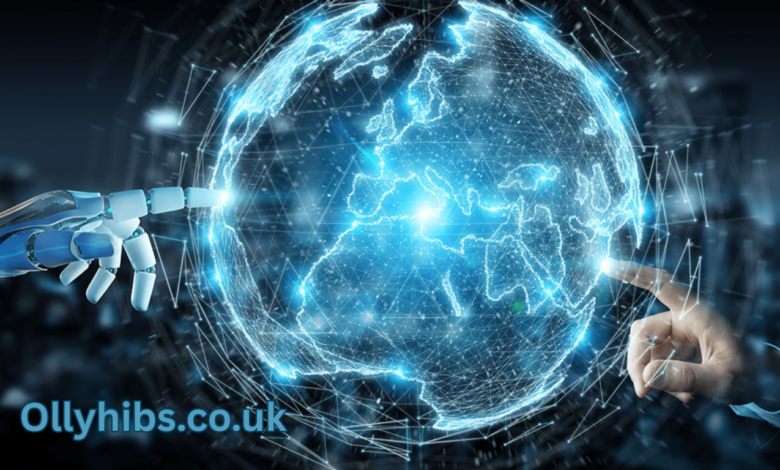How Artificial Intelligence Is Changing the World A Complete Guide

Artificial Intelligence (AI) is no longer confined to research labs or science fiction movies. It has become a global force shaping industries, economies, and the way we live our daily lives. From improving healthcare systems and optimizing transportation to revolutionizing businesses and redefining education, AI is everywhere. Many people ask the question: How artificial intelligence is changing the world? The answer lies in the countless innovations and real-world applications AI delivers every day.
This guide explores the impact of AI across industries, its benefits, challenges, ethical issues, and what the future might look like.
What Is Artificial Intelligence
How Artificial Intelligence Is Changing the World refers to the development of computer systems that can perform tasks typically requiring human intelligence. These include problem-solving, decision-making, understanding natural language, recognizing patterns, and even creating original content.
Types of AI
- Narrow AI (Weak AI): Focused on specific tasks like chatbots, recommendation systems, or image recognition.
- General AI: More advanced, capable of performing intellectual tasks just like humans.
- Superintelligent AI: A futuristic concept where AI surpasses human intelligence.
Understanding these categories is important to grasp how artificial intelligence is changing the world today and how it may evolve tomorrow.
How Artificial Intelligence Is Changing the World in Business
Businesses around the globe are adopting AI to stay competitive and efficient.
Automation of Repetitive Tasks
AI automates time-consuming processes such as data entry, scheduling, and financial reporting, allowing human workers to focus on creative and strategic activities.
Enhancing Customer Experience
Chatbots and AI-powered support systems provide 24/7 assistance. Personalized marketing campaigns use AI to analyze consumer behavior, increasing engagement and sales.
Smarter Decision-Making
Through predictive analytics, AI helps businesses anticipate trends, forecast demand, and optimize supply chains. This data-driven approach boosts productivity and profitability.
AI’s Impact on Healthcare
Healthcare is one of the biggest beneficiaries of AI integration.
Early Disease Detection
AI-powered tools can detect diseases like cancer or heart conditions earlier and more accurately than traditional methods.
Personalized Medicine
By analyzing genetic data, AI tailors treatments to individual patients, leading to improved outcomes.Robotic Surgery
AI-assisted robots perform complex surgeries with unmatched precision, reducing risks and recovery times.
AI in Education
Education systems worldwide are embracing AI to make learning more accessible and effective.
- Personalized Learning: AI platforms like Duolingo adapt lessons to each student’s needs.
- Administrative Efficiency: Teachers save time as AI handles grading, scheduling, and resource management.
- Global Accessibility: AI tools break language barriers, offering learning opportunities to students worldwide.
This is a clear example of how artificial intelligence is changing the world by reshaping education.
AI in Transportation
Transportation has seen massive innovation through AI technologies.
Autonomous Vehicles
Self-driving cars from companies like Tesla and Waymo aim to reduce accidents and improve mobility.
Traffic Management
AI optimizes traffic flow, reduces congestion, and helps cities cut down on emissions.
Logistics and Supply Chains
AI improves delivery systems by predicting delays, optimizing routes, and ensuring efficiency in global supply chains.
AI in Entertainment and Media
Entertainment has been transformed through AI.
- Content Recommendations: Netflix, YouTube, and Spotify use AI to suggest movies, videos, and music.
- AI-Generated Content: Music, films, and even digital art can now be created with AI assistance.
- Immersive Gaming: AI enhances games by creating responsive characters and more realistic experiences.
Ethical Challenges of AI
While AI offers numerous advantages, it also comes with challenges.
H3: Job Displacement
Automation threatens traditional jobs, raising concerns about unemployment in industries like manufacturing and customer service.
Bias and Fairness
If AI is trained on biased data, it can make discriminatory decisions, especially in hiring, law enforcement, or lending.
Privacy Concerns
AI relies heavily on personal data, creating risks of misuse, surveillance, and lack of consent.
The Future of Artificial Intelligence
The future of AI is full of promise, but also requires careful regulation and ethical frameworks. Experts predict:
- Healthcare breakthroughs through AI-driven drug discovery.
- Smart cities powered by AI for sustainability.
- Greater AI-human collaboration across industries.
The way forward must balance innovation with responsibility to ensure how artificial intelligence is changing the world benefits everyone.
FAQs on How Artificial Intelligence Is Changing the World
Q1: What industries are most affected by AI?
Answer: Healthcare, business, education, entertainment, and transportation are among the most impacted.
Q2: Is AI replacing human jobs?
Answer: While AI automates many tasks, it also creates new job opportunities in AI development, data science, and robotics.
Q3: How is AI helping in healthcare?
Answer: It enables early diagnosis, robotic surgery, and personalized treatment plans.
Q4: Can AI be trusted to make fair decisions?
Answer: Only if trained on unbiased data. Otherwise, AI may reinforce human prejudices.
Q5: What is the long-term impact of AI on society?
Answer: AI will continue to drive innovation, but ethical regulations will be critical to prevent misuse.
Conclusion
Artificial Intelligence is reshaping industries, daily life, and the global economy. From healthcare and education to entertainment and business, its influence is undeniable. While there are concerns about ethics, privacy, and job displacement, the benefits of AI are immense when used responsibly.
Ultimately, how artificial intelligence is changing the world is a story of innovation, transformation, and opportunity. The future depends on how we gude its development—with wisdom, fairness, and inclusivity.